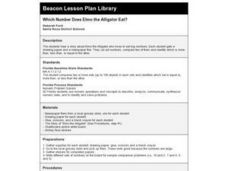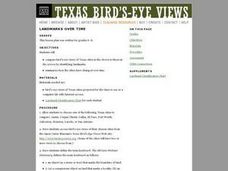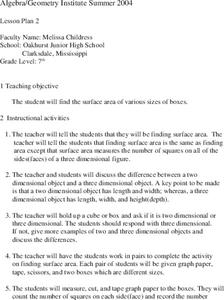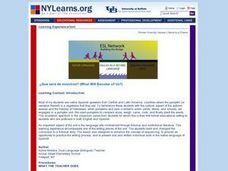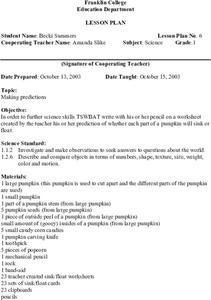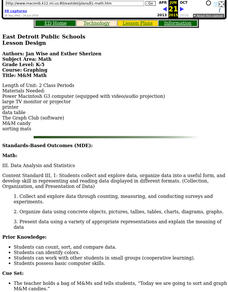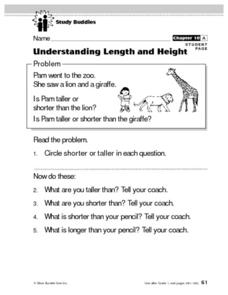Curated OER
Density Destiny
Sixth graders measure and investigate the densities of several objects. They, in teams, determine the mass and volume of each of the 5 objects and record the measurements in the data table.
Curated OER
How Does Light Move?
Second graders investigate how light passes through objects, is blocked, bounces off of things, and bends. They discuss how light moves in different ways, and with a partner walk around the room with a flashlight, shining the light on...
Curated OER
Organelles
Students explore the functions of major eukaryotic organelles. They compare and contrast prokaryotic and eukaryotic cells. Given diagrams and drawings, students take turns drawing structures, discussing their function, and labeling...
Curated OER
A Matter of Proportion
Students measure the relative heights of the mosaic giraffe and its trainer and compare their proportions to an actual giraffe and zoo trainer.
Curated OER
Magnify It!
Students explain that there are limits to what the eye can see and that a magnifying glass can help extend those limits. They examine an object with the magnifying glass and draw the size and shape of what they see as accurately as they...
Curated OER
Which Number Does Elmo the Alligator Eat?
First graders determine whether two or more sets are equal to, more than, or less than the other.
Curated OER
Landmarks Over Time
Students compare/contrast bird's-eye views of Texas cities in the 1800s to those in the 2000s through the identification of landmarks. They write a summary of how one selected city has changed over time.
Curated OER
Surface Area
Seventh graders explore surface area. They study the difference between two and three-dimensional objects. The teacher leads a discussion about finding the surface area of different size cubes. In pairs, 7th graders use graph paper to...
Curated OER
?Que ser de nosotros? (What Will Become of Us?)
Students discuss uses of a pumpkin. They fill out graphic organizers. Students listen as the teacher reads a story, and participate by repeating sounds the objects make as the story progresses. One student narrates the story while others...
Curated OER
Art and Culture
Students compare and contrast the ways in which human figures are portrayed in rock art made by ancient Native American artists and in the drawings and paintings of historic European and American artists. They use images to identify...
Curated OER
Russian Dolls Investigation
Students measure a set of Russian dolls using the metric system. In this measurement lesson plan, students identify certain relationships between sets of measurements by measuring a set of Russian dolls and presenting their findings to...
Curated OER
Show Me a Flowerpot
Students compare and contrast handmade and machine-made products in a study about the evolution of production processes in American history. In this production history lesson, students explore a flowerpot in depth. Students make their...
Curated OER
Making Predictions
First graders write with his or her pencil on a worksheet created by the teacher his or her prediction of whether each part of a pumpkin will sink or float. They drop each of five objects in the water one at a time allowing enough time...
Curated OER
Sink or Float
First graders explore items that sink or float. They cut and glue pictures of objects that they predict will sink or float. Students place thir pictures on a picture of a bucket of water. Students then color the objects that they had...
Curated OER
Patchwork Math
Students recognize and identify shapes in their environment. They investigate why objects can be composed of several different shapes. They follow a pattern to recreate designs using various shapes.
Curated OER
Teaching Nutrition Using the Food Guide Pyramid
Second graders explore how to make healthy eating choices. There are goals included for students to meet by the end of fifth grade.
Curated OER
Let's Measure
Students discuss comparing the size of two different sets of blocks. They estimate the length of the long blocks by answering the following questions: How can you use the small blocks to find out?, and How many small blocks does it...
Curated OER
It's a 3-D World Out There!
Students construct polygons. They identify attributes of three-dimensional shapes. Students name common three-dimensional shapes. They draw three-dimensional shapes, and sort three-dimensional shapes. Students use K'NEX materials sets to...
Curated OER
M&M Math
Young scholars sort a bag of M&M candies according to color using a sorting mat. They count M&M candies. They compare the number to their prediction then students create tally charts.
Curated OER
Writing Similes
Fifth graders identify and write similes. They define simile and discuss different examples, and with the help of a thesaurus, write original similes that compare the colors of crayons to objects or feelings. Students copy their rough...
Curated OER
Understanding Length and Height
In this mathematics worksheet, 1st graders read each word problem and follow its instructions. They identify shorter and taller and compare certain objects to each other.
Curated OER
Potential & Kinetic Energy
Students test different sized marbles and how fast they can go. In this energy lesson plan, students test different sized marbles going down an incline. They predict which would have the most potential and kinetic energy. After the test,...
Curated OER
The Battle of Stones River: The Soldiers' Story
Learners organize items in a "doohickey kit" distributed by the teachers, creating categories using classification schemes. In this classification lesson, students compare systems within groups and write questions that could be answered...
Curated OER
Viscosity Explorer
Students discuss and compare what type of fluids will fill up a beaker first. In this chemistry lesson, students differentiate between pouring glue and water and which will fill the beaker first. They discuss the viscosity of each fluid.







